Working from home: 'People have forgotten how to be sociable'
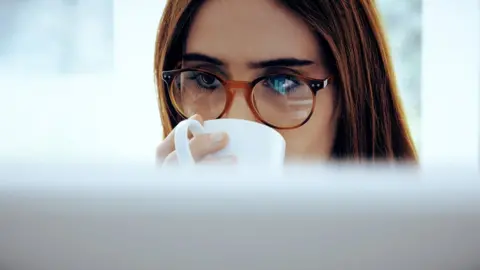 Getty Images
Getty Images"From this evening I must give the British people a very simple instruction - you must stay at home."
Those were the words of Boris Johnson a year ago today, starting 12-months of working from home, or WFH, as people turned their kitchen tables into desks, their spare rooms into offices and juggled home schooling with their careers.
Here, five people share their experiences of remote working and tell how it has impacted on their lives and careers.
'I had clients worldwide'
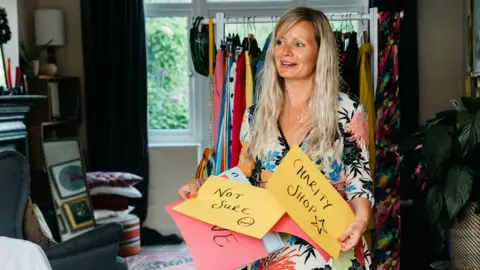 Catherine East
Catherine EastMuch of Bristol stylist Anna Jackson's job was about meeting people either to carry out colour analysis, go through their wardrobes and create outfits or take them to the shops. All of which had to stop when lockdown began.
"It was horrible, really scary," she said. "Scary for health reasons but also because of my work because I had to question where the money was going to come from.
"When we did actually go into lockdown you had all these people doing inspirational things for free, like those concerts Gary Barlow was putting on.
"There was this sense of 'what can I do?' but at the same time there was this feeling of 'hang on, I've got no money'.
"I did decide to offer a lockdown online styling package and suddenly instead of just meeting clients in Bristol, I had clients in America, in London. But it was still hard because I wasn't in the same place.
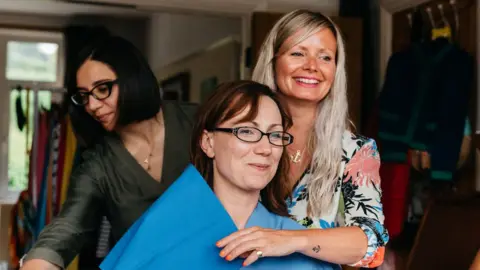 Catherine East
Catherine East"I kept the price low because I felt a lot of people were in the same position as me and worried about money.
"There was a sense that people wanted treats, and I think for some, lockdown stylings almost made them feel like they had been on a night out."
Anna hopes that when lockdown is fully eased, she will be able to go back to meeting customers in person, and that her services will be in demand.
"Everyone keeps saying to me that my business will go crazy because people will really want to dress up," she said.
"I hope that's true. But a lot of people have told me they feel they've forgotten how to be sociable."
'I miss the laughter'
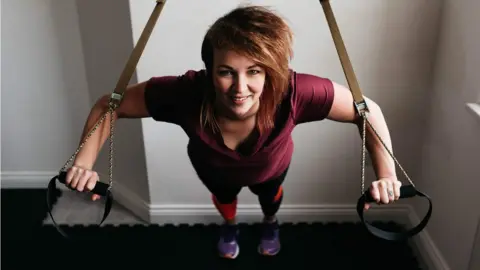 Sarah Langford
Sarah LangfordBefore lockdown, fitness instructor Sarah Langford held her regular classes in a community hall and a sports centre in Bristol, and had to switch to virtual sessions quickly.
"I was lucky that I have my own gym/massage space in my house so all I had to do was move a lot of equipment so I had a clear space," she said.
"Then it was a case of getting to grips with Zoom, which had its tricky moments particularly with working out how to use the microphones.
"I did offer a lot of free classes and the clients were really helpful letting me know what worked and what didn't.
"It clicked very quickly, and now it feels like the new norm."
She said she misses the energy and interaction of the in-person classes and cannot wait to start them again.
"I try and make them [the classes] fun so you will get a lot of laughs, and I miss that because now everyone else is muted.
"But even when lockdown finishes I think some people will stick with the online classes, particularly if they end up still working from home."
'Online is not a downgrade'
 One Thought
One ThoughtPerformance coach Lila Turner, who has worked with clients like Microsoft, The Ministry of Defence and The US Army, said life before lockdown was all about meeting clients in person, often after a commute into her home city of London.
"I think everyone was in shock when Covid arrived," she said. "Everyone was wondering how long it would last.
"When my husband and I fully grasped that things were going to shut down, we instinctively felt we didn't want to adapt straight away, because those early weeks gave us a chance to finish things that always got pushed down the list.
"One of them was an online wellbeing course. Because we mostly work with large corporations, we hadn't been able to dedicate the time to that we wanted."
Lila said there was a "lot of scepticism" among clients that virtual sessions would work, but they tried them out with one company and said it "was amazing".
"What Covid has shown is that being online is not a downgrade. This will change how a lot of people work," she said.
"We have a client in the USA that has said all their employees can live wherever they want, rather than having to be in New York.
"Many of the companies we work with are saying they haven't seen a drop in productivity just because people are working online."
'I want to be myself again'
 Michelle Martin
Michelle MartinWhen lockdown began, freelance writer Michelle Martin was looking after her elderly mother, recently diagnosed with borderline early onset Alzheimer's, at her home in East London, and juggling work with taking her grandson to and from nursery.
The dangers of the virus became all too clear very quickly, she said.
"I had a good friend pass away inside the first two weeks. His wife called an ambulance and after he was taken away, nobody ever saw him again.
"That set the tone for the first couple of months, it felt like everything was closing in."
Michelle is also a carer for her older sister who lives nearby and said she "took on more than she could handle" but that she "had no choice".
"I think I was was on auto pilot for most of the days, I blanked a lot of things out."
Michelle said she was "always worrying" about the people she was caring for.
"At the same time I was trying to write articles. My finances took a hit because my work suffered. Being freelance is convenient in one sense as you can choose when you work, but it was hard to find the time."
'I lost a year's work in 48 hours'
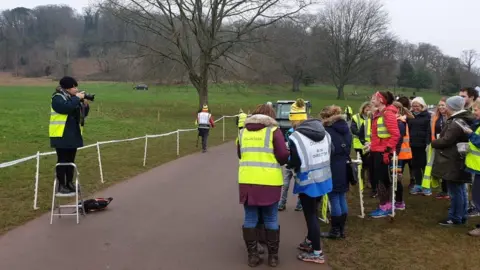 First Avenue Photography
First Avenue PhotographyProfessional photographer Barbara Evripidou said she lost a year's worth of work "in 48 hours" at the start of lockdown.
"We all thought it would be over fairly quickly," she recalls.
"I remember enjoying the first couple of weeks, spending time with the kids and getting a lot of Netflix in.
"But by June, I thought 'this is ridiculous' and realised I had to do something. It was hard to see where my income was going to come from."
She joined two networking groups where she lives in Bristol, Athena and Evo, which led to her making new contacts and learning new skills.
Photography bookings returned slowly in the autumn and have started increasing again recently, which Ms Evripidou says is "a great relief". Her concern is now for her children.
"My two oldest have really struggled to motivate themselves recently," she said.
"I've got a 17 year-old who should have been enjoying that summer between GCSEs and A-levels last year, and that was stolen from him.
"My kids have become real 'homebirds' which is really sad, because at their age they should be out there enjoying themselves."
